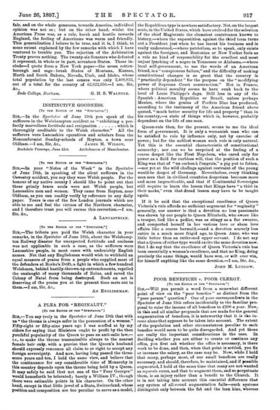SIR,—You say truly in the Spectator of June 19th that
with us " the throne is always safer in the possession of a woman." Fifty-eight or fifty-nine years ago I was scoffed at by my elders for saying that Ministers ought to profit by the then youthful popularity of the Queen to pass an anti-salic law,- i.e., to make the throne transmissible always to the nearest female heir only. with a proviso that the Queen's husband should expressly renounce all claim to or right to accept any foreign sovereignty. And now, having long passed the three- score years and ten, I hold the same view, and believe that the continuance for any considerable time of Monarchy in this country depends upon the throne being held by a Queen. It may safely be said that not one of the "Four Georges" would henceforth be tolerated ; barely a William IV., though there were estimable points in his character. On the other hand, except in that little jewel of a State, Switzerland, whose position and composition are too peculiar to serve as a model, the Republican type is nowhere satisfactory. Not, on the largest scale, in the United States, which have evolved for the seleetion of the chief Magistrate the clumsiest contrivance known to history,—where the superstition against the third term turns out a President just when he has learnt his business and is really understood,—where patriotism, so to speak, only exists against the foreigner, and Bostonian or New Yorker feels as a rule no kind of responsibility for the cruellest and most unjust lynching of a negro in Tennessee or Alabama,—where local self-government, to use the words of an American friend, is a" conspicuous failure," and the difficulty of making constitutional changes is so great that the country is "practically dependent" for the purpose on the "modifying power of Supreme Court construction." Not in France, where political morality seems to have sunk back to the level of Louis Philippe's days. Still less in any of the Spanish - American Republics or Brazil, unless perhaps Mexico, where the genius of Porfirio Diaz has produced, according to the testimony of the American friend above quoted, "much better security for life and property" than in his country,—a state of things which is, however, probably dependent on the life of one man.
Queen-rule then, for the present, seems to me the ideal form of government. It is only a womanish man who can be satisfied to rule by influence only, not by exercise of power; but for the noblest woman such rule is only natural. Yet this is the essential characteristic of constitutional monarchy ; nor can we be surprised at the feeling of a coarse despot like the First Napoleon, who cared only for power as a field for curbless will, that the position of such a. King was that of "un cochon l'engrais," a pig put to fatten, —nor yet at the wild chafings against restraint of the young would-be despot of Germany. Nevertheless, every thinking man sees that in civilised countries despotism becomes more and more impracticable, and that if Continental Sovereigns still require to learn the lesson that Kings have "a thin l in their necks," even that dread lesson may have to be taught again.
If it be said that the exceptional excellence of Queen Victoria's rule affords no sufficient argument for " reginalty " generally, our answer is that a devotion no less passionate was shown by our people to Queen Elizabeth, who swore like a trooper, lied like a pedlar, was as stingy as a fur sweater, and comported herself in her various love or sham love affairs like a coarse barmaid,—and a devotion scarcely less entire in a much more frigid age, to Queen Anne, who was little better than an enthroned upper servant. I do not say that a Queen of either type would excite the same devotion now. But I do say that the excellence of Queen Victoria's rule has been essentially a woman's excellence, and that no King, doing precisely the same things, would have won, or will ever win, for himself anything like the same devotion.—I am, Sir, &c., JOHN M. LUDLOW.


















































 Previous page
Previous page